Photographs: Jahnavi Sheriff
Shameem Akthar, yogacharya trained with the Sivananda Yoga Vedanta Center, Kerala, reveals the poses that can keep your mane healthy.
Where hairfall and balding is genetic, it would be impractical to suggest that yoga can sort it out. But when the problem is due to lifestyle or health issues, then yoga can be a strong complementary therapy to support other aesthetic and cosmetic solutions you undertake.
To understand how yoga works, it would be wise to learn of triggers, apart from heredity, that can cause hair fall: these include sudden weight loss, certain medications, nutrient deficiency, excessive fibre intake (which can push out the good nutrients before they are absorbed), hormonal shifts with normal aging, chronic sickness, excessive stress and the inability to cope with it.
Yoga practice works by helping de-stress, improving digestive efficiency, curing or controlling chronic sickness and helping support weight loss goals. Also, as with massage, it works on acupressure points and improves circulation to the scalp, promoting nutrient transport to hair follicles, thus aiding and sustaining hair growth.
This is true especially of forward bends and inversions. Some examples of good forward bends include the Paschimottanasana (seated westward facing pose/seated forward bend), the Parvatasana (mountain pose also called the downward dog or Adhomukhasvanasana). The inversions include simple poses like the shoulder stand (Sarvangasana), headstand (Sirsasana), and Viparitakarani Mudra (inverted psychic union pose) among others.
Shameem Akthar, yogacharya trained with the Sivananda Yoga Vedanta Center, says that for yoga to help in this regard, the practice has to be regular, the sequence organised to include the above poses, as well as include a long-ish meditation to ensure the stress angle is taken care of.
Catch more of Shameem's yoga writings or upcoming workshops at http://jaisivananda.blogspot.com
This article only attempts to enthuse readers towards yoga practice and complement your existing practice. Yoga is best learnt under the personal guidance of a teacher.
Balasana (child pose)
Image: Balasana (child pose)Photographs: Jahnavi Sheriff
Kneel, so you rest on your heels, as shown. Those who are not flexible may have to spread the knees a bit. Raise your arms high, inhaling. Exhaling, lower them to the ground, beside your hips, palms facing up, bringing forehead to the ground/mat. Allow the neck to relax. Those who cannot reach the forehead to the ground may keep a cushion/stool on which to rest it. Everything should be loose and relaxed. Hold initially for a short while, but extend duration for a few minutes with regular practice. Continue normal breathing throughout. To release from pose, raise hands up, lifting head.
Avoid: If you have a knee problem.
Benefits: Promotes blood circulation to the head, helping prevent hair loss, keeping skin supple and young. Powerful de-stressor.
Paschimottanasana (seated forward/westward facing pose)
Image: Paschimottanasana (seated forward/westward facing pose)Photographs: Jahnavi Sheriff
Sit with the legs stretched out in front, feet together. Inhale, raise your hands up. Exhaling, lower them to the legs (or at the side as shown). Hold the toes, if possible, or any part of your leg, depending on flexibility. Continue normal breathing, thinking of moving chest to the thighs. Hold for a few seconds, initially, then building stamina to hold for a few minutes, over several weeks. To release from pose, inhale, raise arms above.
Avoid: If you have a lower back problem or very high blood pressure.
Benefits: Same as above, especially regarded as a youth-promoting pose due to the all-round benefits it confers.
Parvatasana (mountain pose)
Image: Parvatasana (mountain pose)Photographs: Jahnavi Sheriff
Also called Adhomukha Svanasana or downward facing dog. Sit in the cat pose, on your fours, walk feet a bit back. Lift knees off the ground. Keep feet together. Press down from the shoulders. Focus eyes on stomach, or between the toes. Hold for as long as possible. Breathe continuously. To release pose, drop back on your knees. Repeat thrice. Later build up stamina to hold for longer, for a minute or so.
Benefits: This is a complete body workout. The downward drag on the head causes a bloodrush to the head and face, working on keeping them younger.
Viparita Karani Mudra (inverted psychic union pose)
Image: Viparita Karani Mudra (inverted psychic union pose)Photographs: Jahnavi Sheriff
Lie on your back with your legs stretched out. Keep hands along the sides of your body. Inhale and hoist your hips off the ground. Prop your hips with both hands.
Hold this pose for a few seconds initially, slowly increasing duration in the final pose to several minutes, with regular practice. Maintain normal breathing throughout. To return to the starting position, place your hands back on the ground with your palms down. Lower your hips back gently, and then finally drop your legs gently back to ground.
Benefits: Like all inversions, it reverses the effect of gravity on the body, a primary cause for aging. It improves blood flow to the head and face.

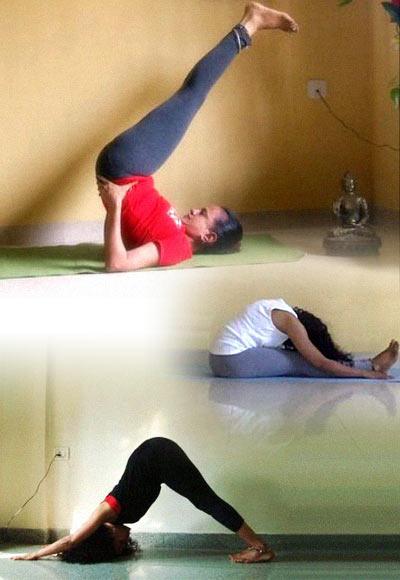
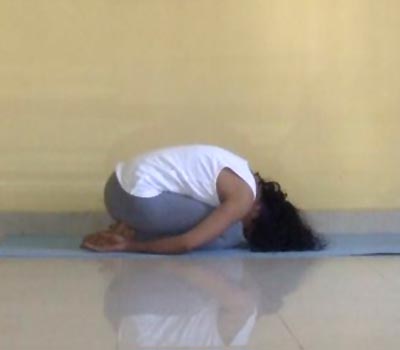
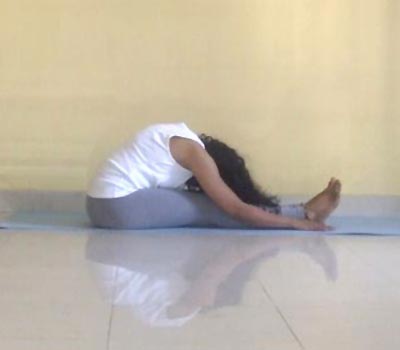
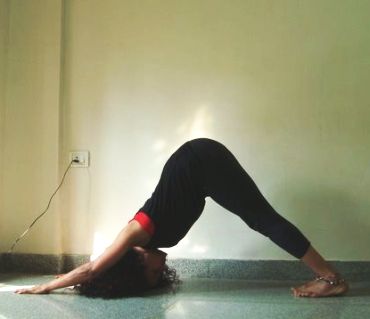
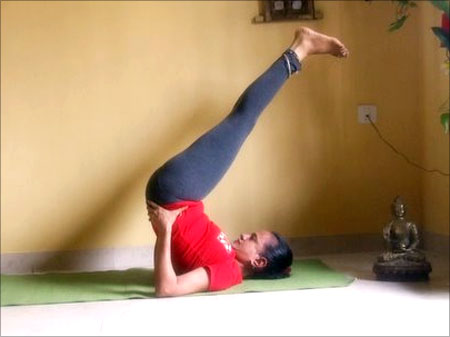
Comment
article